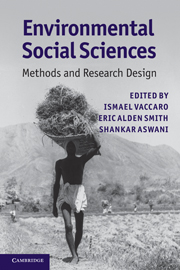Book contents
- Frontmatter
- Contents
- Contributors
- Foreword
- Preface
- 1 Introduction
- 2 People, numbers, and natural resources: demography in environmental research
- 3 Production decisions and time allocation: a guide to data collection
- 4 Analyzing the politics of natural resources: from theories of property rights to institutional analysis and beyond
- 5 Extreme events, tipping points, and vulnerability: methods in the political economy of environment
- 6 Local communities and natural resources: ethnobiology in practice
- 7 Mapping histories: cultural landscapes and walkabout methods
- 8 Metaphors and myths in news reports of an Amazonian “Lost Tribe”: society, environment and literary analysis
- 9 Water decision-makers in a desert city: text analysis and environmental social science
- 10 Linking human and natural systems: social networks, environment, and ecology
- 11 Khat commodity chains in Madagascar: multi-sited ethnography at multiple scales
- 12 Spatiotemporal methodologies in environmental anthropology: geographic information systems, remote sensing, landscape changes, and local knowledge
- 13 Deep time, diachronic change, and the integration of multi-scalar data: archaeological methods for exploring human–environment dynamics
- 14 Comparing trajectories of climate, class, and production: an historical ecology of American yeomen
- 15 Socioecological methods for designing marine conservation programs: a Solomon Islands example
- Index
- References
1 - Introduction
Published online by Cambridge University Press: 05 June 2012
- Frontmatter
- Contents
- Contributors
- Foreword
- Preface
- 1 Introduction
- 2 People, numbers, and natural resources: demography in environmental research
- 3 Production decisions and time allocation: a guide to data collection
- 4 Analyzing the politics of natural resources: from theories of property rights to institutional analysis and beyond
- 5 Extreme events, tipping points, and vulnerability: methods in the political economy of environment
- 6 Local communities and natural resources: ethnobiology in practice
- 7 Mapping histories: cultural landscapes and walkabout methods
- 8 Metaphors and myths in news reports of an Amazonian “Lost Tribe”: society, environment and literary analysis
- 9 Water decision-makers in a desert city: text analysis and environmental social science
- 10 Linking human and natural systems: social networks, environment, and ecology
- 11 Khat commodity chains in Madagascar: multi-sited ethnography at multiple scales
- 12 Spatiotemporal methodologies in environmental anthropology: geographic information systems, remote sensing, landscape changes, and local knowledge
- 13 Deep time, diachronic change, and the integration of multi-scalar data: archaeological methods for exploring human–environment dynamics
- 14 Comparing trajectories of climate, class, and production: an historical ecology of American yeomen
- 15 Socioecological methods for designing marine conservation programs: a Solomon Islands example
- Index
- References
Summary
Environmental social science
Environmental social science has its roots in several disciplines and research traditions, ranging from anthropology to zoology Disciplinary identities and frameworks continue to play a significant role: environmental anthropology, political ecology (centered in geography), environmental social science, and similar named entities in several other disciplines have their own associations, scholarly journals, and sets of issues. But increasingly there is convergence, transdisciplinary interaction, and the forging of a coherent if loosely bounded research community, with scholars and practitioners from many different disciplines in the social sciences, humanities, and applied fields engaged in fruitful dialogue and collaboration. This volume aims to foster this emerging field by presenting authoritative summaries of central research methods in a manner accessible to all. In the next section, we summarize the organization of the volume and the content of each chapter; but first, in the present section, we wish to situate this emerging field in a broader intellectual and historical context.
There are many factors that helped generate environmental social science, but two are prominent. The first was the realization that landscapes and the multitude of components they contain cannot be understood without serious consideration of past and present human communities. It is now widely understood that most terrestrial and near-shore environments are profoundly shaped by human actions – they are “socionatural” systems (Balée 2006; Denevan 1992; Smith and Wishnie 2000). These anthropogenic impacts are not limited to large-scale societies, but extend back to the initial dispersal of Homo sapiens some 60 000 years ago, and include effects that both enhanced and diminished biodiversity and ecosystem functions.
Information
- Type
- Chapter
- Information
- Environmental Social SciencesMethods and Research Design, pp. 1 - 10Publisher: Cambridge University PressPrint publication year: 2010
References
Accessibility standard: Unknown
Why this information is here
This section outlines the accessibility features of this content - including support for screen readers, full keyboard navigation and high-contrast display options. This may not be relevant for you.Accessibility Information
- 2
- Cited by
